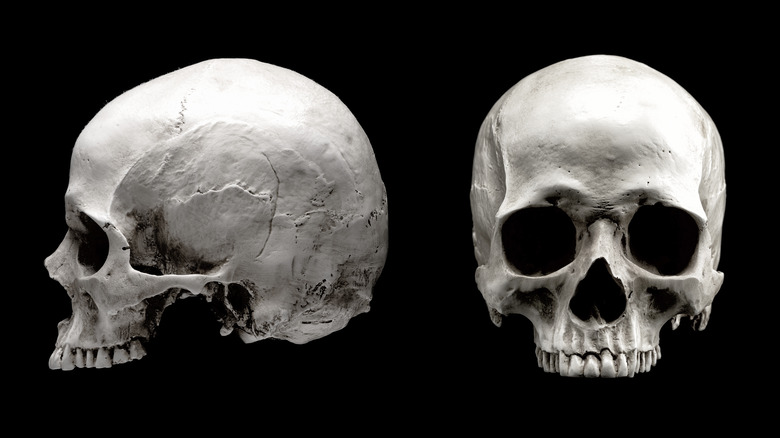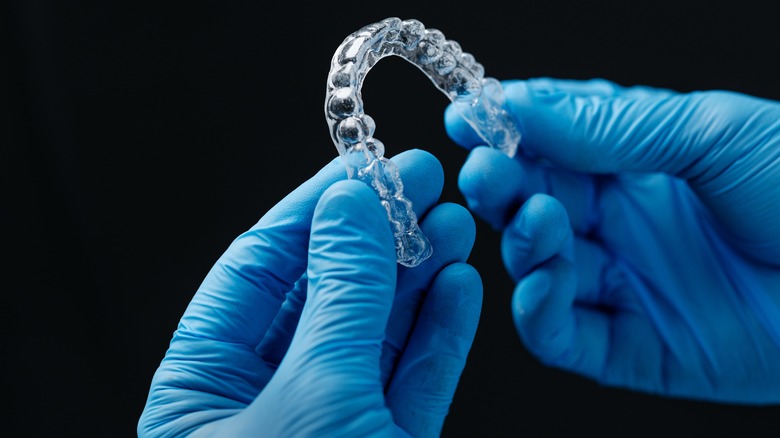How A Bite Mark Expert Played A Key Part In Several Wrongful Murder Convictions
In the 1980s and 1990s, Michael West became one of the world's most revered forensic odontologists. As reported by Oxygen, West seemed to be specifically adept at matching bite marks on murder victims with the teeth of perpetrators. In addition to using "direct comparison" — physically placing molds from the perpetrators' teeth against the victims' wounds — he also developed a new method to positively identify markings on corpses as human bite marks.
ABA Journal reports West used UV light to find trace wounds on the skin and ultimately "prove" they were bite marks. According to Oxygen, West's newly developed identification method helped secure his reputation. Adam Freeman, who is also a forensic odontologist, said West was "a pioneer in the field of forensic odontology at the time." West also had an impressive educational background, having attended the Louisiana State University School of Dentistry, the Armed Forces Institute of Pathology, and the American Academy of Forensic Science.
After decades, West's methods were determined to be flawed
Throughout his career, Michael West claims he investigated the cause of more than 5,200 deaths and attended more than 5,800 autopsies (via Oxygen). He also claims he examined and analyzed more than 300 bite marks. West's expert testimony about bite marks helped prosecutors secure multiple murder convictions over several decades. However, forensic odontology, and West's methods in particular, were eventually revealed to be far less precise than previously thought.
ACLU reports forensics experts began questioning West's conclusions as early as the mid-1990s, and complaints were ultimately filed with three professional organizations that he was a member of. As a result, West voluntarily left two of the organizations and was suspended from the other. Although his methods and conclusions faced intense scrutiny, West continued testifying in criminal trials into the early 2000s. He ultimately retired amid increasing criticism of his methods (via Men's Health). However, there was serious concern that several people may have been wrongfully convicted as a result of West's flawed methods and conclusions.
Kennedy Brewer was convicted of murder based on West's testimony
In the early morning hours of May 3, 1992, 3-year-old Christine Jackson was abducted from her Noxubee County, Mississippi home. Two days later, her body was found in a creek only 1,500 feet from her home. It was ultimately determined the toddler was sexually assaulted in addition to being murdered.
As reported by the Innocence Project, Kennedy Brewer, who was dating Jackson's mother, Gloria, was watching her daughter and two younger siblings when the abduction occurred. Authorities noted there were no signs of forced entry into the home. However, they did find a broken window near the bed where Jackson was sleeping. Law enforcement officials immediately suspected Brewer, as he was alone with the children when the abduction occurred, and they did not believe anyone broke into the home. The medical examiner, Steven Hayne, also discovered several marks on Jackson's body, which appeared to resemble bite marks.
Michael West was called to examine the marks. The Innocence Project reports West determined the toddler was bitten 19 times and concluded the bites were "indeed and without a doubt" inflicted by Brewer (per Innocence Project).
If you or anyone you know has been a victim of sexual assault, help is available. Visit the Rape, Abuse & Incest National Network website or contact RAINN's National Helpline at 1-800-656-HOPE (4673).
Kennedy Brewer's conviction was overturned when another man confessed
At the time, Michael West had already been suspended from the American Board of Forensic Odontology. However, the Innocence Project reports he was still permitted to testify at Kennedy Brewer's trial. Based largely on West's testimony, Brewer was ultimately convicted of first-degree murder and sexual battery and was subsequently sentenced to death. However, he maintained he did not commit the heinous crime.
Although DNA was found at the scene, the Innocence Project reports the technology was not available to confirm whether it belonged to Brewer. However, in 2001, the technology became available, and the DNA found at the scene was compared with Brewer's DNA. The test revealed Brewer did not commit the crime. Instead, the DNA belonged to a man named Justin Albert Johnson, who eventually confessed to abducting, sexually assaulting, and killing Christine Jackson. Johnson also confirmed that he acted alone and never bit the victim. During Brewer's trial, a forensic odontologist, who testified for the defense, said the marks on Jackson's body were most likely caused by insects.
If you or anyone you know has been a victim of sexual assault, help is available. Visit the Rape, Abuse & Incest National Network website or contact RAINN's National Helpline at 1-800-656-HOPE (4673).
Johnson's confession freed another man convicted of murder based on West's testimony
During his confession to the murder of Christine Jackson, Justin Albert Johnson confessed to abducting, sexually assaulting, and killing, another toddler. On the evening of September 15, 1990, 3-year-old Courtney Smith was abducted from the bedroom of her Brooksville, Mississippi home. Two days later, the Innocence Project reports her body was found in a pond approximately 240 feet from her house.
Medical examiner Steven Hayne, who would later examine Jackson, conducted the autopsy and called Michael West, as he believed some of the wounds on Smith's body were bite marks. During his subsequent examination, West compared the wounds — which he determined to be human bite marks — with tooth impressions from 12 suspects. He concluded the bite marks were made by a man named Levon Brooks, who previously dated Smith's mother.
Although several people testified that Brooks had an alibi, West's testimony about the bite marks, which he asserted "no one but Levon Brooks" could have inflicted, secured Brooks' conviction (per Innocence Project). He was ultimately convicted of first-degree murder and sentenced to life in prison. As reported by the Innocence Project, Brooks spent 16 years in prison before Johnson confessed to the crime, and he was subsequently exonerated. As was the case with Christine Jackson, Johnson denied biting Courtney Smith.
Two others convicted based on West's testimony had their convictions overturned
In 2012, Leigh Stubbs and Tammy Vance, who both spent 11 years in prison, were released when their aggravated assault convictions were overturned. As reported by the Innocence Project, both women were convicted based on testimony provided by Michael West. In 2000, Stubbs and Vance left a drug treatment facility where they were treated for addiction. Another woman, Kimberly Williams, joined them, although she had not completed her treatment. Coxwell Law reports all three women left the facility and went to Williams' boyfriend's home, where Vance and Williams took prescription painkillers and drank alcohol. All three women then went to a hotel to sleep.
The following morning, Stubbs and Vance went to breakfast and left Williams behind. When they returned to the room, they found Williams unresponsive. Stubbs and Vance called an ambulance and performed CPR while waiting for help. As reported by Coxwell Law, it was initially determined that Williams overdosed on drugs and alcohol she had recently consumed. Although she survived the incident, she had no memory of the events leading up to her being hospitalized.
Although it seemed as though Williams had clearly overdosed, Stubbs and Vance were arrested and eventually convicted, based, in part, on evidence provided by West. Although her doctors did not note any unusual wounds, HuffPost reports West testified that he found bite marks in photos of Williams' skin that matched Stubbs and Vance's teeth.
If you or anyone you know needs help with addiction issues, help is available. Visit the Substance Abuse and Mental Health Services Administration website or contact SAMHSA's National Helpline at 1-800-662-HELP (4357).





